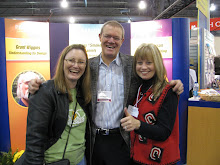A Facebook quiz (i.e., time waster) recently prompted me to read Georgia author Carson McCullers's book The Member of the Wedding. I'm ashamed to say I never picked it up before; the vivid images she evokes through her description of simple, everyday objects and events in the life of a Southern girl should be shared. Her description of the grape arbor took me immediately to the days of my childhood when I stayed at my Granny Jewell's home in Shawnee, Georgia:
Frankie was too tall this summer to walk beneath the arbor as she had always done before. Other twelve-year-old people could still walk around inside, give shows, and have a good time. Even small grown ladies could walk underneath the arbor. And already Frankie was too big; this year she had to hang around and pick from the edges like the grown people. She stared into the tangle of dark vines, and there was the smell of crushed scuppernongs and dust (1946, p. 7).
I was also impressed by her manipulation of grammar, specifically her use of pronouns. I should look more often for examples to show my students of how a writer understands grammar so well that she or he can manipulate it so effectively. Here is one such excerpt. Frankie, the protagonist, is thinking about her brother and his bride-to-be who have traveled back to Winter Hill:
The darkening town was very quiet. For a long time now her brother and the bride had been at Winter Hill. They had left the town a hundred miles behind them, and now were in a city far away. They were them and in Winter Hill, together, while she was her and in the same old town all by herself. And as she sickened with this feeling a thought and explanation suddenly came to her, so that she knew and almost said aloud: They are the we of me. Yesterday, and all the twelve years of her life, she had only been Frankie. She was an I person who had to walk around and do things by herself. All other people had a we to claim, all others except her. When Berenice said we, she meant Honey and Big Mama, her lodge, or her church. The we of her father was the store. All members of clubs have a we to belong to and to talk about. The soldiers in the army can say we, and even the criminals on chain-gangs. But the old Frankie had had no we to claim, unless it would be the terrible summer we of her and John Henry and Berenice--and that was the last we in the world she wanted. Now all this was suddenly over with and changed. There was her brother and the bride, and it was as though when first she saw them something she had known inside of her: They are the we of me. And that was why it made her feel so queer, for them to be away in Winter Hill while she was left all by herself; the hull of the old Frankie left there in the town alone (p. 35).
Frankie wants so badly to belong, which McCullers emphasizes just by the stylistic use of personal pronouns. Something to think about: Who is the we of me?
22 hours ago




